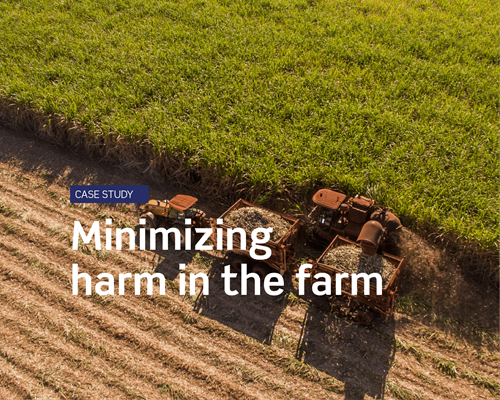 The Corbion value chain starts with the sourcing of raw materials. These include (among others) the sugar needed to create many of our products – which in turn form a valuable part of our customers’ products. So how exactly are we creating sustainable impact in this area? Corbion Vice President of Sustainability, Diana Visser, explains.
The Corbion value chain starts with the sourcing of raw materials. These include (among others) the sugar needed to create many of our products – which in turn form a valuable part of our customers’ products. So how exactly are we creating sustainable impact in this area? Corbion Vice President of Sustainability, Diana Visser, explains.
Protecting human rights
Harvesting raw materials like sugar cane is hard and heavy work. This is why Corbion is actively engaged with suppliers to ensure that the workers in the industry are treated safely, fairly, and with dignity. “Taking good care of people in our value chain is the right thing to do,” says Diana, “And by doing so, it actually benefits our suppliers because well-treated workers are more motivated and productive.” Here, Corbion employs an extensive Cane Sugar Supplier Code. This applies to the mill itself as well as the surrounding areas; and covers many aspects of operations, including the environment, business ethics, quality - and extensive human rights and labor conditions. Suppliers are audited and assessed annually against a wide range of criteria, including health and safety, wages, hours, contracts, and discrimination. If identified as failing to meet the standard, Corbion will work with them to rectify the situation.
Nurturing biodiversity
This data-driven approach to sustainable impact also extends to environmental issues. Corbion’s customers manufacture everything from furniture to cosmetics. To help guarantee the integrity of these products, they need to know that the raw materials used in Corbion’s products are farmed ethically and sustainably. In the case of sugar cane and other raw materials including soy, wheat, and corn, Corbion has a Sustainable Agriculture Policy in place with suppliers which contains various fundamental principles, including protecting biodiversity and eliminating deforestation. For example, insects are essential for pollinating certain plants. If their habitat is destroyed and they die off, our entire ecosystem collapses. “This is also where the economic component of sustainability comes into play,” says Diana. “If there are no pollinators, an alternative solution is needed. Perhaps drones are used for this work but it’s hardly an ideal solution, and it could certainly be an expensive one.”